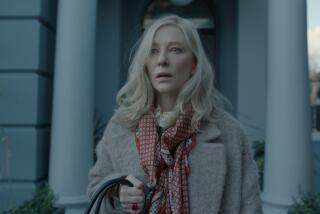Scandal Worthy of an Austen Novel: ‘Blame and Denial’
Poor Jane Austen. “Sense and Sensibility” is Oscar material. “Pride and Prejudice” was a six-hour miniseries this week. Given her keen eye for the social classes, what insight she could bring to our local scene had she not been dead these last 179 years.
‘Tis a pity, indeed, to die before one’s time.
Picture her, quill pen in hand, chronicling the Orange County bankruptcy in a book she undoubtedly would have titled “Blame and Denial.”
*
“You vex me, sir,” Mr. Stanton said. “Not since my undergarments bunched on me a fortnight ago have I felt such consternation or the need to remonstrate with such vigor.”
The object of Mr. Stanton’s discomfit was Mr. Citron, a man of modest means and undistinguished bearing but who had, curiously, attained a level of high respectability in the village. As the controller of the purse, Mr. Citron had assumed an importance all out of proportion to his talents or temperament, but from which nonetheless Mr. Stanton and others had derived much benefit and never gainsaid. So ‘twas now shocking to see what once had been unbridled admiration suddenly turn into such willful depredation. So much so that it would be fair to say at that moment that Mr. Citron took on all the characteristics of a titmouse under the withering assault.
“Pray that you would stop this rebuke, sir, or, failing that, at least reduce your stream of spittle in my direction,” he said to Mr. Stanton. “Rest assured your vexation is no greater than my own. And may I say, sir, that were my problems at this moment limited to creeping garb, I would surely celebrate the inconvenience. I fear, however, they are not.”
“Enough!” Mr. Stanton fumed. “I vouchsafe I have seldom seen such nincompoopery. I am sorely tempted to strike a blow, and not a light one, to your chops, sir. Be certain that it is not dignity that prevents me but the fear that news of it would travel and cause others to see me as a ruffian and incline to me less favorably.”
Recovering somewhat from his earlier lightheadedness and sobered by the ferocity of the attack from a man who once profited off him, Mr. Citron mustered what some would call a defense of himself. “My good man,” he said, “was it not you who delighted in my successes without knowing how they were achieved? Memory fails, sir, to record a moment when you looked askance at my success, even, dare I now say, when perhaps you should have. If anyone, sir, it was you who championed what you now insist on calling folly.”
Reddening beyond the hue of the brightest radish, Mr. Stanton was quick to parry. “By God, man, if I had a useful pair of shears, I would cut out the tongue that makes such a statement. Should you ever say such a thing aloud in the village, the health to which you now lay claim will become quite open to question.”
“Does the supervisor threaten me, or are these words to be taken as merely the imprecations of a cornered man?”
“The supervisor means to tell you that he has not spent a career pretending to have mastered the intricacies of public finance only to be humiliated by your irretrievable bumbling. If your brain were a coin, it would surely be a farthing and nothing more. You may alert the public to your failings, if you wish. I have no such intention.”
“Understandable, sir,” Mr. Citron said, “but how did you surmise I compiled the fortune to which you so readily laid claim?”
“I don’t give a flying finch how you did it, nor would I be carrying on so had you continued to do it. My cause suffers only because you have stopped doing it. Saying so, the village now is desirous of inflicting a punishment most foul upon me, and I will have none of it.”
“Your meaning could not be clearer,” Mr. Citron responded. “Had I mistaken your words, your clenched fists and near-bursting veins would have signaled your intent. Your conversation, while quarrelsome, gives me pause and chastens me.”
“Out! Out!” Mr. Stanton shouted. “Were it in my power, I would feed you to the squirrels and be none the sadder for it.”
Mr. Citron walked away, desirous of having Mr. Stanton think he was overcome by contrition. And that was the effect, for Mr. Stanton took full pleasure in believing he had stung Mr. Citron in a most significant way. Unbeknownst to Mr. Stanton, however, Mr. Citron’s remorse rose nowhere near the level it outwardly displayed. Had Mr. Stanton seen Mr. Citron’s countenance as he walked from him, he would, in fact, have detected the faintest of smiles, a smile born of Mr. Citron’s private glee at the embarrassment his actions would bring to Mr. Stanton.
For his own part, Mr. Stanton was left with his thoughts, the most prominent of which at that moment was how vexing the matter had become.
How very vexing, indeed.
Dana Parsons’ columns appears Wednesday, Friday and Sunday. Readers may reach Parsons by writing to him at the Times Orange County Edition, 1375 Sunflower Ave., Costa Mesa, CA 92626, or calling (714) 966-7821.
More to Read
The complete guide to home viewing
Get Screen Gab for everything about the TV shows and streaming movies everyone’s talking about.
You may occasionally receive promotional content from the Los Angeles Times.






